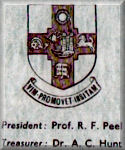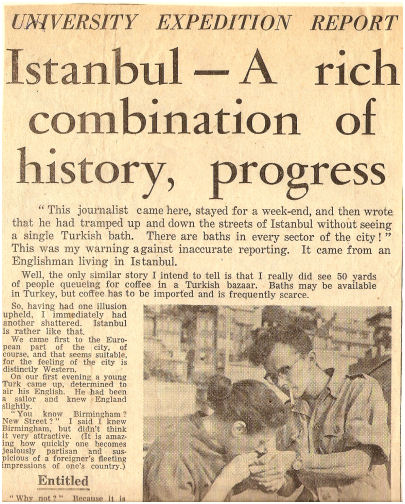University
of Bristol Trans-Continental Expedition 1960 — 61 | ||||||||
| ||||||||
| Published Thursday November 3rd 1960 | ||||||||
"This journalist came here, stayed for a weekend, and then wrote that he had tramped up and down the streets of Istanbul without seeing a singe Turkish bath. There are baths in every sector of the city!" This was my warning against inaccurate reporting. It came from an Englishman living in Istanbul. Well, the only similar story I intend to tell is that I really did see 50 yards of people queueing for coffee in a Turkish bazaar. Baths may be available in Turkey, but coffee has to be imported and is frequently scarce. So, having had one illusion upheld, I immediately had another shattered. Istanbul is rather like that. We came first to the European part of the city, of course, and that seems suitable for the feeling of the city is distinctly Western. On our first evening a young Turk came up, determined to air his English. He had been a sailor and knew England slightly. "You know Birmingham? New Street?" I said I knew Birmingham, but didn't think it very attractive. (It is amazingly how quickly one becomes jealously partisan and suspicious of a foreigner's fleeting impression of one's country.) Right: Mark lights his last cigarette in Europe - with Annette Duncan who with her husband Tom helped the Expedition in Istanbul Entitled "Why not?" Because it is dirty and industralised, I said - coming from the North I feel I have the right to comment. "But you mustn't say that, industry is good, industry has the power." Perhaps if he had been to the North himself he might have said: "Wher there's muck, there's money." But probably "power" was a more accurate word. He was not thinking on a personal, but a national level. Here is the conception, in the cities, of Turkey's need - industry and the power that it gives. Yet we met a youth from an Army school in Eastern Turkey who said: "We are taught that Turkey must remain an agricultural country." Focal point The villages still seem to be run on community lines with families, by tradition, continuing the same work, and with resources being pooled. This is the difference between the Turkey of the villages and the new Turkey of the cities. Istanbul, more than Ankara, is the focal point of the change. In its cosmopolitan population it combines history and progress. The
dichotomy is shown by a casual conversation with the proprietor of a shop as he
fastened up our parcels. The man was a Greek: he was asked how long he had lived
in Istanbul. Many changes In fact he had lived there during the lifetime of "modern Turkey," but - "it had been called Constantinople for 1,600 years and he could see no reason for a change." There have been many changes. The history here has been one of superimposition. The original city was Byzantium founded in 658 B.C. by the Greek merchant Byzans Vivas. It was allied to Rome and finally captured by Constantine in 324 A.D. The capital of the empire was transferred here in 330 A.D. and the city renamed Protected Town, New Rome, and then Constantinople. (Did the change of name from New Amsterdam to New York make an immediate change in the city's character?). It was now Roman. As capital of the empire it withstood some 29 sieges. In 1453 it fell to the Ottoman Turks under Sultan Mahommed II. Fez abolished Mustaph Kemal Pasha became President in 1923 and the name is now officially Istanbul. Greek, Roman, Christian, Mahommeddan. And now Turkey became a secular state. By legislature during the 15 years of his presidency, Kemal Attaturk abolished the national religion, the fez, the religious laws, the Mahommedan calendar, and the Arabic numerals and alphabet, and replaced them with the European hat, the metric system, and a system of law based on Roman law, and adopted Sunday instead of Mahommedan Friday as the national day of rest. Modern Turkey certainly looks towards the West. But during the time of the last government, while mosques in the cities were being used as warehouses and for other secular purposes, new ones were being built in the villages - pandering to the backward and superstitious elements, say the city dwellers. Army coup Ismet Inonu succeeded Kemal Attaturk as leader of the only party and the President in 1938. In 1946 it was permitted that the Democratic Party be formed. At the election of 1950 the Democratic Party surprisingly won a large majority, Celal Bayar became third President and was re-elected in 1954 and 1957. On May 27 1960, following student demonstrations, an Army coup was carried out under the leadership of Gen. Cemal Gursel: President Bayar, Prime Minister Menderes, members of the Government and many Deputies, were arrested. But power was not returned to Inonu, still leader of the Opposition. Instead a new Constitution is being prepared by members of the university and free elections are promised. Jackboots gone The previously all-powerful police force has been demilitarised, their field-grey uniforms and polished jackboots have been replaced with civilian-type dark blue shirts and slacks and soft shoes, and they are relegated to mere traffic control. Everywhere one sees soldiers - the soldiers who earned great commendation for bravery during the Korean War and who obey their officers blindly. Turkish intellectuals seem pleased at the overthrow of the Menderes Government, but prefer to reserve their judgment of the new leadership. They remember the records of recent military regimes in other countries and are awaiting a positive gesture of good faith. Death demanded Meanwhile, the previous administration are imprisoned in a fortress on an island in the Sea of Marmora and are on trial before a military court. Naturally life in the city continues. There are sufficient contrasts to satisfy the most avid collector of sensations. The approach from Europe is an eight-mile dual carriageway with up to four lanes each way. Adjacent to these beautiful modern streets, lit by electric light standards of aesthetic design and great efficiency, are the narrow, cobbled, hilly streets of the old quarters - the shops and bazaars. Drawbacks These are dimly-llit and most romantic. Residents must quickly tire of hearing tourists eulogise over them, for picturesqueness, like genius, is notoriously difficult to live with; its demands are high and it has concomitant drawbacks. In this case untidiness and aromatic odours - to use polite words; and the lower windows are not uniformly barred for nothing, I am sure. In fact this effect is often attractive - metalwork in many oriental patterns, great inventiveness and artistic ability having created a beauty out of necessity. When caught in an apparently timeless traffic jam the visitor has many new things to interest him; the bead or plastic cord hangings over shop doorways, the overhanging balconies with carved balustrading, the innumerable street vendors carrying small packs or even tables on which to show their wares. The resident has seen them all before. His eye is, to say the least, jaundiced, his mind fully occupied calculating the delay in reaching his destination, his finger weary with constantly pressing the horn. The variety of the street tradesmen is extraordinary, but where a thriving shop with a large trade must be crammed into a small bazaar alcove it is not surprising that smaller traders have to carry their counter around with them. They vary from those giving a service - knife grinding, shoe-cleaning - to those selling commodities, from items of clothing to food, raw and cooked. Picturesque The shoe-cleaners are perhaps the most picturesque. Their brightly-painted footrests are flanked by at least a dozen polish bottles with shining brass tops and festooned with brushes, mops and dusters. They also have empty cigarette cartons which are used to protect the clients' socks from the furious activity of the brushes. There are constant crowds and through them push the "ajmals," the registered porters, carrying loads that would take several men to lift, bending almost double as they stagger along under their unbelievable burdens - they make the feats in a certain well-known advertisement seem infantile by comparison. It would not be surprising to see one carrying a piano on his head. Contrasts By comparison, the wide smooth boulevards offer fast routes from one end of the city to the other. The clearance necessary in order to lay them has opened up fine views of he remaining buildings - it took a war to do this in London. But, of course, the variety of architecture can be seen, a 7th century Roman aqueduct, a Byzantine church, a 16th century Mohammedan mosque and a contemporary Senate House. In this city there is very little impression that theglories of the past are being forced upon the vsitor, the resident seem quite casual about their architectura remains - so much so that the American Byzantine Society have become active in order to preserve the old churches with their beautiful mosaics and murals. The sight of a Byzantine Christian church with minarets added after 1493 to turn it into a mosque is a lesson in itself. Fortunately, the obscuring of Christian symbols and decoration carried out at the same time was carelessly done with soft plaster, so many of these beauties are now being uncovered. Friendliness We spent three hectic days in Istanbul. Three days of diplomatic arrangements and car maintenance mixed up with sight-seeing. Without a base to work from this would have been most difficult. However, we had the good fortune that we are coming to expect - or perhaps it should be more accurately be described as universal friendliness and hospitality. At the Greco-Turkish border we met a young British couple, Mr and Mrs Tom Duncan, who both taught in an Istanbul school, and who insisted on putting us up during our stay. Not only were they our hosts, but, having lived for two years in Istanbul, they were efficient and well informed guides. By a coincidence, Mrs Annette Duncan had qualified at the Bath Training College! Tours and tea With them we saw the mosque of Suleiman the Magnificent (1557), the most beautiful Blue Mosque of Ahmed (1616), the underground cisterns, the Aya Sophia Byzantine Museum, seraglios and palaces. And at night we drank tea at the edge of the Bosphorus looking across at Leander's Tower and Florence Nightingale's Hospital on the shores of Asia, which we would shortly visit. | ||||||||
|


 The
journalist came here, stayed for a weekend....
The
journalist came here, stayed for a weekend....